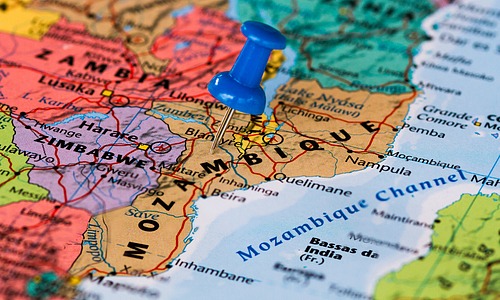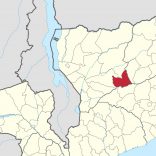A father’s hope for his malnourished son in rural Cabo Delgado
Mozambique risks “downward spiral” in governance indexes – Transparency International’s Mokgabo Kupe

Transparency International’s regional adviser for southern Africa has warned that Mozambique risks entering a “downward spiral” in assessments on governance and corruption, stressing the urgency of strengthening transparency and accountability.
“Without concerted efforts to support transparency and accountability, Mozambique could find itself in a downward spiral in the indexes on governance and corruption,” Mokgabo Kupe said.
The head of TI for Southern Africa spoke to Lusa news agency about the performance of Portuguese-speaking African countries in the 2020 Corruption Perceptions Index, released yesterday.
In this year’s edition, Mozambique lost one point, falling from 26 to 25, and dropped from 146th to 149th [out of 180 countries], after rising 12 positions in the previous year.
“The political and governmental elite in Mozambique continues to use corruption to accumulate business and opportunities and to enrich themselves,” Kupe said, decrying the lack of commitment of “power holders” to the fight against corruption.
“Corruption in public procurement is an important issue. During the Covid-19 pandemic, public tenders were held without transparency and works assigned through direct awarding,” she said.
The official also noted the “multiple reports” of business people being kidnapped, with “rumours of police involvement”.
“Entrepreneurs have been extorted by the police with ‘freedom fees’ to avoid being kidnapped,” she alleged, adding that the experts and entrepreneurs who are the source of the data included in the Index are aware of this.
In this context, Mokgabo Kupe indicates Mozambique as one of the Portuguese-speaking countries that will deserve specials attention from the organisation in future.
“Mozambique faces the challenge not only of corruption and fiscal fragility, but also of a growing insurrection in Cabo Delgado, which threatens to destabilise the region,” Kube added, recalling that “several players have interests in the province” rich in natural resources, including natural gas and precious stones.
The Transparency International regional adviser considered that Mozambique “failed” to build strong and independent institutions and pointed out the “doubtful credibility” of the 2019 elections.
“The 2016 hidden debt scandal discredited the entire political elite and the institutions of control and inspection, in addition to destroying the image of the ruling party,” she stressed.
On Angola’s progress in the last three editions of the index, Mokgabo Kupe considered “an upward movement in the score” common when there is regime change, explaining that the “government’s anti-corruption motivation” and the “investigations and legal proceedings” launched “probably contributed to the improvement of the score”.
“What remains to be seen is whether anti-corruption rhetoric is maintained as action and whether there is a consistent flow of lawsuits against the corrupt,” she said, considering it imperative that justice be applied “impartially” to both the population and the political elite.
Kupe also highlighted the “interesting case” of Guinea-Bissau, which moved up three places from 168th to 165th.
“This improvement in the index is a great achievement, because the country has suffered several coups d’état and is a typical case of a fragile state. Even a few years ago, it was thought that top have become a narco-state,” she said.
About Equatorial Guinea, which has been a member of the Community of Portuguese Speaking Countries (CPLP) since 2014 and remains among the last positions of the index, with no record of major progress, the expert noted that the country is “a dictatorial state” governed by the same family since independence.
“Promoting transparency and fighting corruption is simply not a priority,” she said.
Cape Verde remained in 41st position with 58 points, after rising from 45 place in 2019. It consolidated its position as the third best-ranked country in sub-Saharan Africa, after Seychelles (66 points) and Botswana (60 points), which, respectively, occupy positions 27 and 35 among 180 countries.
For Mokgabo Kupe, Cape Verde’s lack of progress in the last year is part of a “global trend of stagnation” registered in almost half the countries included in the index.
“Efforts to fight corruption appear to have stalled, contributing to a decline in confidence in government institutions,” she said.
“In Cape Verde, as elsewhere, we need stronger supervisory institutions, open and transparent public contracts, a secure environment to hold the government accountable and guaranteed public access to information,” she advanced.
This year’s report highlights the impact of corruption on government responses to Covid-19, comparing countries’ performance on the index with their investment in health care and analysing the extent to which democratic standards and institutions were weakened during the pandemic.
Countries that performed well on the index were those that invested most in health care, and proved the most capable of providing universal health coverage and least likely to violate democratic norms and institutions or the rule of law.
By region, Western Europe and the European Union maintain the highest average with 66 points. Sub-Saharan Africa, with 32 points on average, remains the worst performing region, followed by Eastern Europe and Central Asia, with 36-point averages.
Two-thirds of the 180 countries analysed recorded scores below 50 points, with the average for all countries standing at 43 points.
Twenty-six countries improved their scores over the previous index and 22 slipped back. The remaining countries saw little or no change.












Leave a Reply
Be the First to Comment!
You must be logged in to post a comment.
You must be logged in to post a comment.